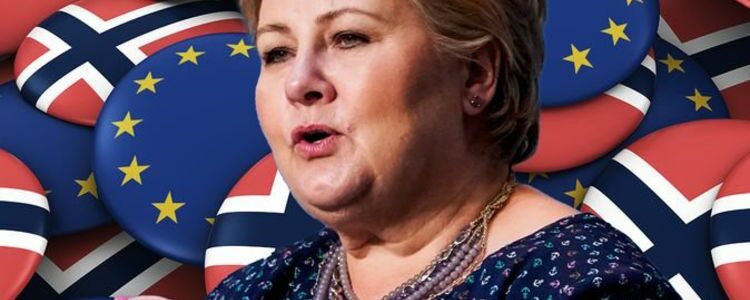
Shock for Brussels as eurosceptics set to join next government in Norway – latest polls
European Union is ‘new communism’ says Nigel Farage in 2013
We use your sign-up to provide content in ways you’ve consented to and to improve our understanding of you. This may include adverts from us and 3rd parties based on our understanding. You can unsubscribe at any time. More info
Centre-left opposition parties are expected to beat the Conservative-led coalition government by a two-to-one margin in next months ballot, a new poll has shown. The result would hand Labour Party leader Jonas Gah Store a chance to negotiate a power-sharing agreement with left-leaning groups. And it would spell an end to current prime minister Erna Solberg’s hopes of securing a third conservative term.
She was praised for her quick response to the coronavirus pandemic, giving Norway one of Europe’s lowest Covid mortality rates.
But Ms Solberg has, however, faced huge criticism over economic inequality and public sector reforms.
In April, the prime minister was fined by police for breaking social distancing rules at her birthday party.
The latest polling is showing that the centre-left could grow its number of seats in the 169-member assembly to 114 from 81.


This would put them ahead of the Conservatives and smaller centre-right parties, who are on track to win just 55 seats, down from 88, according to the survey.
The poll, carried out by Kantar between August 2-6 for independent TV2, comes just as the election campaign kicks off.
It also confirms the downward trend for the conservatives as shown in other similar studies.
Labour is campaigning on a slogan that it is now the “common people’s turn”, with promises of tax relief for low and middle-income families.

The party has also vowed to end privatisation of public services, spend more cash on hospitals and a tax hike on the top 20 percent of earners.
Norway’s Green Party and far-left Red are both set to bolster their number of parliamentary seats, giving them power to influence the Labour-led government.
This could also have a significant impact on how Norway’s relationship with the EU develops in the future.
Oslo has access to the European Union’s single market as a member of the European Free Trade Association in return for playing by Brussels’ rules.
MUST READ: Brexit battle looms as heated border row on brink of explosion

Established in 1994, the arrangement, which includes Iceland, Liechtenstein and Norway, covers the free movement of goods, capital, services and people.
It also covers competition and state aid rules, but there is no inclusion in the EU’s agricultural and fisheries policy.
Labour Party leader Jonas Gah Store, its candidate for prime minister, has repeatedly claimed Norway’s Nato and EEA membership will be untouchable in a new centre-left government.
The Socialist Left party opposes both Nato and EEA membership, while the Centre party has spoken out against the close ties with Brussels.
The Red party are also considered to be vehemently eurosceptic.
If their combined seats in the Norwegian parliament is larger than Labour’s, they will demand much more political influence in a new government.
DON’T MISS
Here we go again! EU clashes with Pfizer on vaccines price hike [REVEALED]
WHO red alert: Man dies as highly-contagious new virus identified [INSIGHT]
French winemaking nightmare as Britons turn back on EU goods [ANALYSIS]
Expert discusses ‘fear in Brussels’ in February 2021
This means Norway could refuse EU laws that are relevant to its EEA agreement.
Since 1994, Oslo has adopted thousands of laws dictated by Brussels without much debate in Norway’s parliament.
According to its agreement, Oslo has the option to refuse implementation of EU directives but a “no” would trigger a reaction from eurocrats.
The looming threat has kept a series of Norwegian governments from vetoing EU-driven legislation.
In a 1994 referendum, Norway said no to EU membership for the second time in its history.
Polls show that more than 60 percent of Norwegians still oppose joining the Brussels bloc.
Source: Read Full Article